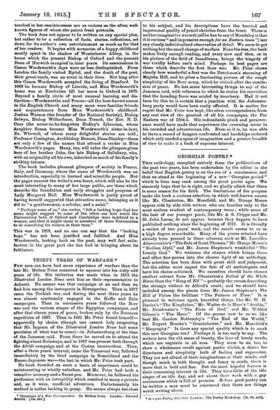THIRTY YEARS OF WARFARE.*
FEW men can have had more experience of warfare than the late Mr. Melton Prior contrived to squeeze into his sixty odd years of life. His initiation was made when in 1873 the Illustrated London News sent him as their representative to Ashanti. No sooner was that campaign at an end than we find him among the insurgents in Herzegovina. Then in 1877 came the Turkish war, and during the next three years he was almost continually engaged in the Kaffir and Zulu campaigns. Then in successive years followed the Boer war and the various stages of the Egyptian campaigns, and after that eleven years of peace, broken only by the Burmese expedition of 1887. Then in 1895 Mr. Prior found himself— apparently by choice (though one cannot help suspecting that Mr. Ingram of the Illustrated London News had some prevision of what was to come)—in Johannesburg at the time of the Jameson raid. From there he moved on to attend the fighting about Bulawayo, and in 1897 was present both through the Afridi campaign and at the Cretan insurrection. Then, after a three years' interval, came the Transvaal war, followed immediately by the brief campaign in Somaliland and the Russo-Japanese war—the last in which Mr. Prior took part.
No book founded on such a basis of experience could be uninteresting or wholly valueless, and Mr. Prior bad both a retentive memory and a fluent pen. Moreover, be followed his profession with an intrepidity which resulted in many a private and, as it were, unofficial adventure. Unfortunately his method is rather lacking in grasp. He seems always too close
to his subject, and his descriptions have the hurried and impersonal quality of pencil sketches from the front There is neither imaginative warmth (all he has to say of Mandalay is that it is curious "and impressive enough for an Eastern town") nor any closely individualized observation of detail. We seem to get nothing but the small change of warfare. None the less, the book makes lively enough reading, and every now and then, as in his picture of the field of Isandlwana, brings the tragedy of war vividly before one's mind. Perhaps its best pages are those which describe the first Boer war. Mr. Prior shows clearly how wonderful a feat was the Dutchmen's storming of Majnba Hill, and be gives a fascinating picture of the rough simplicity of the Boer army, which he visited after the conclusion of peace. He has some interesting things to say of the Jameson raid, with reference to which he states his conviction that the invading force was misled by treachery. Had it not been for this he is certain that a junction with the Johannesburg party would have been easily effected. It is matter for regret that Mr. Prior was kept, like other correspondents, from any real view of the greatest of all his campaigns, the Far Eastern war of 1904-5. His indomitable pluck and perseverance would have made that experience the crowning scene in his crowded and adventurous life. Even as it is, be was able to leave a record of dangers confronted and hardships endured which only needed a spice of imagination and a greater breadth of view to make it a book of supreme interest.






































 Previous page
Previous page